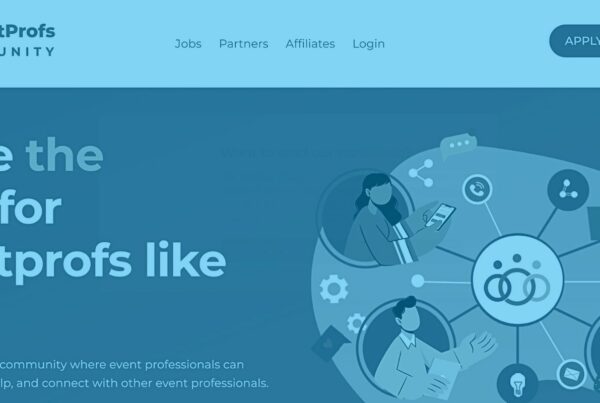Event translation and transcription are a segment that’s been on the rise in recent years. Will and Brandt discussed the increase of booths for these services at IMEX Frankfurt and IMEX America. As a result, in this Event Tech podcast episode, the tech duo outlines how to work with translation, transcription, and captioning services in your events.
Implementing these services into your event can be full of benefits, making your events accessible to international audiences and those with auditory impairments. But, when done poorly, translation, transcription, and captioning services can lead to a poor attendee experience and even offend listeners. To help you ensure that doesn’t happen, Will and Brandt share tips for working with the services and explain how you can ensure you’re getting the total value from these services. Let’s dive in!
How Event Translation has Always Been Done
Brandt starts the episode by sharing how the industry has typically handled translation in the past. “The traditional way of doing translation would be to set up a booth, either backstage or back of the house,” he explains. “You would have however many languages and a physical person there, listening to the audio and translating it into a microphone that would then get broadcast to someone’s headset. That’s the way it was done for years.”
How Event Translation can be Done Virtually
Following rapid changes in the events industry in recent years, translation services operate differently today. For example, you no longer need a translator to be present at the event venue. “For our international events, the translator was wherever,” says Will. “It’s much easier to find a Portuguese translator in Brazil than in the United States. So they started utilizing translation services via live stream audio.”
“Pre-pandemic, we were already seeing apps that did exactly that,” adds Brandt. “It eliminates a lot of hassle. You don’t need that booth or those extra headphones, and it’s a lot cheaper too. The translator could sit in their house and do it from their house.”
But, while it may be easier to find translators because of virtual connectivity, it can also pose some challenges. “In many cases, I found that sometimes translators were unprofessional,” says Will. “It’d sound like someone was cooking behind them or talking to them. And because events are usually very long, they’ll have multiple translators; you could hear a stark difference between the professional and unprofessional person. Be careful when it comes to this sort of thing; just make sure to do a lot of tests an hour or two ahead. If you can replace the translator, you can avoid those scenarios.”
Two-Way Translation
When thinking about translation, it’s easy to consider it a one-way flow. Listeners tune in to a translation channel and listen to the audio. After the show, they take off their headsets and move on to the next thing on their agenda. But in many cases, both speakers and attendees rely on two-way translation, making translation a bit more complex.
“I was speaking at an event in Mexico, and they had a translator going from English to Spanish and Spanish to English,” says Will. “When I went up to speak, I needed to speak in English, but if I got a question from someone, it had to be translated. That made it difficult because I was constantly taking the headset on and off. Think about what your system’s going to be like. If you have the budget, consider having two translators.” That will ensure listeners tune in to that channel and only hear the relevant translation.
“I’ve heard other people complain about that, so I think that’s a valuable point,” says Brandt. He also finds that both sides in 2-way translation often end up on the same channel. “As I’m talking, I need to take the headphones off to hear my own thoughts. Then somebody asks a question, and it needs to be translated back. Having separate channels for that is huge.”
Customization and Tiers in Translation Services
Moving on, Brandt begins to explain how he categorizes translation services and how they work. He thinks of the services in low, medium, and higher cost tiers.
Low-Cost Services
This first category includes machine/autogenerated captions, transcriptions, and translations. “As a general rule, auto-generated captions are not great,” claims Brandt. “They’re good enough to get the gist, and they’re better than nothing. But they’re certainly not good enough.”
One example of a low-cost service is auto-captioning. This is where “people are talking, the software is auto transcribing using auto-captioning. Then it gets run through a translator and pushed out [in the other language],” concludes Brandt.
But as Will points out, these low-cost services can lead to miscommunication or make it difficult for the listener to follow along. Many languages feature sentence structures different from English. “Because these captions appear live, it’s translating word-for-word,” which means sentence structure and meaning can get lost.
Middle Tier Services
Sitting between low and high-cost services is autogenerated software that corrects for things like sentence structure and grammar. “I’ve seen services autocorrect as it goes along,” says Brandt. “So it’s spooling it out as it hears it and then going back to asking, did that make sense? It’s still machine-generated, but it will wait until it’s clear that you’ve ended your sentence to go back and determine if the translation makes sense.”
“Something that helped a lot is technological development,” adds Will. “Auto punctuation has been helpful; it can detect when you’re ending a sentence or using an exclamation point. Paste things didn’t exist until the last 5 years or so.”
“The next level, then, is individual machine language translations, where it takes the English and translates it directly into another language. So, there are different versions of the machine running. I would posit that it’s probably going to be more accurate because it’s not transcribing and then translating; it’s specifically designed to translate directly from English to German,” Brandt concludes.
(You Have to Prepare for Top Tier Services)
Jargon is an added layer of complexity that can make it hard for translation services to translate accurately, but the best services can accommodate unique language. You just have to help them.
As Brandt explains, custom dictionaries are a standard solution. “We are still going to have problems with names, medical devices, scientific words, Latin words, or whatever your group’s vocabulary is. Some services offer a custom dictionary, where you can give it a text file of all the weird things you say in your group.”
Will emphasizes how vital preparation is when it comes to executing translation well. “Brandt brought up this custom dictionary, which requires pre-production work and for you to think ahead about what you’re going to do.” He recommends prepping the translators. “For example, Give them a presentation you’ve done in the past, create a custom dictionary, and let them know the context of your content.”
“This stuff is important,” continues Will. “And, we’re not talking hundreds of hours. Have a three-hour meeting with your translation company and go over what everyone’s talking about, the topics, give them information, slide decks, and things like that. They will be like, ‘You got us 90% further than most of our other clients.'”
Higher Cost Services
As is often the case with autogenerated services, the human-driven versions are the most expensive and may be the most accurate. “The most expensive translation version is actually using real people on the back end,” says Brandt. “It looks like it might be AI-generated, but it’s real human beings translating or transcribing on the fly. The person can be sitting in their own home just listening in. They just need a clean audio feed of the event.”
“We’ve come full circle but what I wanted to get at is your point about working with services,” he continues. “Pre-pandemic, dealing with translation services, the people who needed to sit in the back booth always wanted slide decks in advance. The more information you can give them in advance, the more accurate your translation and transcription will be.”
“I had the pleasure of working in Turkmenistan once, and they were amazing,” says Brandt. “For weeks, they hounded me to get a copy of my slide deck. It turned out I was one of the only presenters who did it, and as a result, I had really accurate translations. The translators came up and thanked me for sending the stuff in. They said, ‘Yours is going to be the most accurate of any of the translations we’re going to do.’”
Final Takeaways
The pandemic rattled the events industry and lurched event software forward by years. It’s clear that event translators and their services are a part of that leap in growth and will play a significant role in international and virtual events for the foreseeable future. So, Brandt wants to leave you with one last takeaway from this episode. “There’s more to transcription and translation than just flipping a switch. There are multiple ways to do it, each of which will affect your budget and the quality of services differently.”
“I think we’ll always share this tip, get involved with your production company,” adds Will. “They’ll help you figure out how the audio feeds are going to go, where the channels are going, and they’ll give you tips.”
If you have tips for incorporating translation, transcription, or captioning services at your events, send them to us! We’d love to hear about how you approach these services and how event planners can support the accessibility these services bring to events. Thanks for joining us for another Event Tech podcast episode. We’ll see you here next time!








